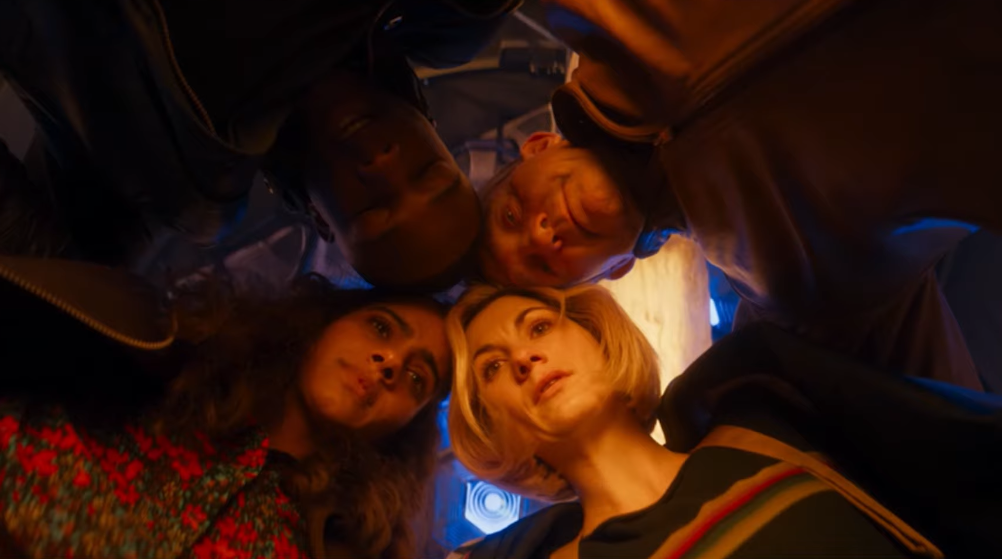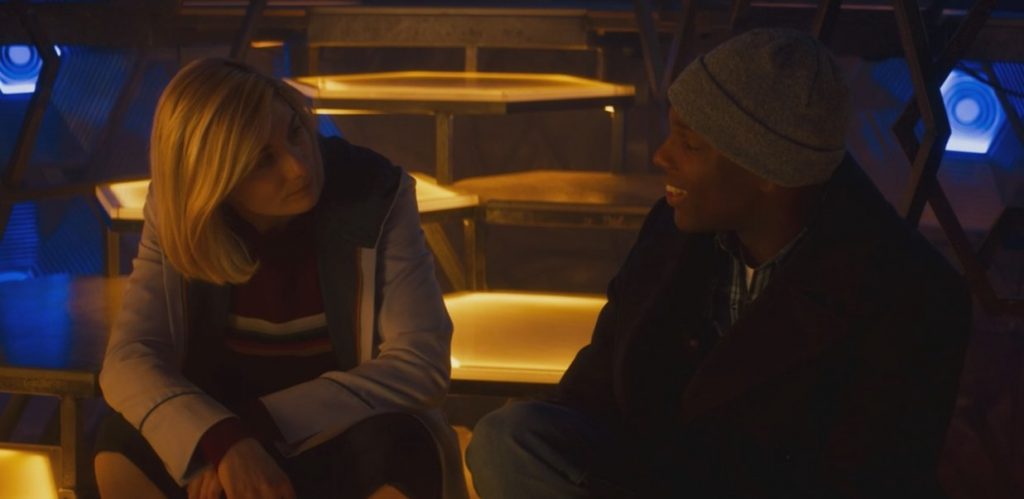By Kiyan • 29 January 2021

It’s 2021, and you know what that means: it’s the 58th anniversary of people moaning about Doctor Who.
This year, we’re off to a great start. As soon as Revolution of the Daleks finished airing, people took to the internet to wax on about why this latest Doctor Who special is an affront to all that’s good and decent about the world.
But among the slew of typical, lazy complaints — the companions suck, the Doctor is boring, etc. etc. — one in particular stands out:
“Why don’t the people of Earth recognize the Daleks in Revolution of the Daleks?”
This question has been weighing on my mind ever since I first started seeing it pop up in early January. Not because I care what the answer is (I don’t) or because I’m upset that Revolution of the Daleks introduces this discrepancy (I’m not).
But because it’s actually important.
It speaks to something wildly interesting that the current era of Doctor Who does. As different as it may be from what Modern Who accustomed us to from 2005 through 2017, Current Who (2018–now) embraces the show’s past in the most sly, spectacular of ways: by means of paradox. It takes the seemingly abandoned concerns of the earliest seasons of New Who and makes them formal instead of diegetic, disengaging with “canon” to explore, instead, past ideas through the schema of new rhetoric.
Because its companion write-outs break “canon” and employ “retcons” to translate the language of Doctor Who’s past persuasive aims from a diegetic one into a formal one and valorize the ordinary over the extraordinary, Revolution of the Daleks paradoxically engages with Doctor Who’s history to suggest that even though reconciliation takes sacrifice, its rewards far outweigh its setbacks.
How?
Let’s dive in and find out.
The Ordinary and the Extraordinary
In its earliest seasons, New Who often preoccupied itself with the idea that normal, everyday people are important — more important, in fact, than extraordinary ones.
“An ordinary man,” the Doctor tells Rose in Father’s Day, is “the most important thing in creation.”
This sentiment carried on for most of those early seasons (and even became somewhat of a meme on our podcast.) It’s the ordinary, Doctor Who seemed to claim at the time, and not the extraordinary that is truly of value.
But a closer look reveals otherwise. Narratively, Modern Who (2005–2017) appears to leverage its cast in maneuvers whose meanings largely contradict its characters’ suggestions that the ordinary supersedes the extraordinary. On the contrary: it uses its principal cast’s write-outs and final appearances on the show to venerate people of remarkable persuasion or circumstance.
Featuring characters such as Amy and Rory, (who travel through time), Clara and Bill (who embark on cosmic voyages of their own), and Donna (who faces mind erasure at the end of her onscreen story), 2005–2017 Who consistently focuses on companions whose departures expand the spatiotemporal and hermeneutic boundaries of their lives and whose resolutions call on the extraordinary while edging the normal into further and further peripheries.
None of these companions return to normal life. Their lives, in fact, the show affirms, will never be the same after their travels with the Doctor. This is, of course, because of the experience and insight that travelling the cosmos has granted them. But it’s also because their journeys and stories proceed to the inevitable logical conclusion of progressively intensifying remarkability: extraordinary displacement, and in some cases, even more “cuh-raaaaaazy!” journeys that promise to continue offscreen the trend of increasingly out-there adventures, each wowing more than the last, that Doctor Who, at the time, embraced and around which it built its ever more convoluted “canon.”
But Current Who (2017–now), as the departure of companions Ryan and Graham in Revolution of the Daleks evinces, turns this formula on its head, transplanting what were once diegetic concerns of the show’s characters into the formal structure of Doctor Who itself to suppose the value of none other than the absolutely, incontrovertibly, at times even maddeningly ordinary.
Revolution of the Daleks and the Temporality of Reconciliation
Time-bound storytelling formats like traditional television shows necessarily include as a structural component the element of time because time necessarily relates to and often even governs their construction and organization. In other words, in television, temporality becomes explicitly formal.
As a traditionally broadcast television show, Doctor Who fits this mold. In Doctor Who, time is a matter of form.
Though its somewhat special status as a BBC production (or these days, a production for BBC or something like that — I’m not up to date on the specifics) means that Doctor Who is perhaps not as beholden to the same temporal constraints that other television programs are, financial and generic (“of genre”) concerns mean that, like any other time-restricted television story out there, Doctor Who has to determine what it will spend its (currently) 50-minute runtime on.
Curiously, Revolution of the Daleks doesn’t use any of its 70 minutes (it’s a special, so it’s longer than average) to address what you might think it would address given the revelations of the previous episode, The Timeless Children.
In The Timeless Children, the Doctor learns that she is not who she thought she was. She learns that she is not originally from Gallifrey as she (and we) always believed.
Distraught, the Doctor asks the Fugitive Doctor (Jo Martin’s Doctor), who appears before her inside the Matrix, questions whose answers would help her align her thoughts and would shed clarifying light on the confusing murk into which these revelations have plunged her.
But the Fugitive Doctor doesn’t answer the Doctor’s questions.
In fact, her response to the Doctor seems simply to raise even more questions.
She asks the Doctor why the fact that “[the Doctor’s] memories aren’t compatible with what [she’s] learnt today” matters so much when the Doctor has never “been limited by who [she] was before.”
Revolution of the Daleks follows up on this conversation in the most literal sense: it spends time addressing what the Doctor learned on Gallifrey but offers no further insight into the many questions these revelations raise, instead spending time reiterating The Timeless Children’s takeaway and formally diminishing even further what little importance The Timeless Children seemed to suggest the potential answers to these questions might hold.
Partway through Revolution of the Daleks, the Doctor confides in Ryan. She tells him a bit about what she learned on Gallifrey, revealing that she isn’t who she thought she was and that her past holds many more secrets than she ever imagined it could. Ryan responds in much the same way the Fugitive Doctor did: he tells the Doctor that she is who she is no matter how things might change, affirming that he appreciates who she is now and who he knows she’ll continue to be regardless of her past.

In this moment, Ryan doesn’t just invoke the human and personal sentiment that Current Who (2017–now) embodies (and that borders on saccharine, but that’s a whole nother discussion for a whole nother time); he also emphasizes temporality. Ryan tells the Doctor that she will “find out about her own life” when they’re “done with this Dalek problem.” Addressing the revelations of The Timeless Children can wait, says Ryan. First and foremost comes the matter at hand: the Daleks. Revolution of the Daleks, Ryan in other words indicates, doesn’t have the time — and therefore does not have the formal (because temporal) wherewithal — to deal with matters of displaced canon and mismatched continuity.
It has bigger formal fish to fry.
Fish called Daleks.
But even when it comes to its own namesake, Revolution of the Daleks dismisses matters of continuity formally by spending its time on other stuff.
“Why don’t the people of Earth recognize the Daleks in Revolution of the Daleks?”
Revolution of the Daleks doesn’t answer this question.
Revolution of the Daleks doesn’t care. It dedicates its time to matters much more mundane (literally mundane in the etymological sense: “worldly”).
Because while Revolution of the Daleks doesn’t spend even one second addressing why the people of Earth don’t recognize the Daleks, it spends a great deal of time on its epilogue, a heart-to-heart moment between Ryan and Graham that brings them right back full circle to where they started.
In this epilogue, Graham has resumed teaching Ryan how to ride a bike. The two have received psychic paper from the Doctor and hint that they will continue to solve supernatural problems and right paranormal wrongs even though they have left the Doctor.
But like Ryan tells the Doctor, there’s a time and place for everything. “I’m not done here yet,” Ryan says of his cyclical travails, indicating what the episode itself indicates formally by spending its last bits of time not on the adventures on which Ryan and Graham may or may not go but the return to normal life (a first for a companion in over a decade) and the mundane but important challenge to achieve riding a bike with dyspraxia: that the ordinary truly does supersede the extraordinary.
By allocating its time like this, Revolution of the Daleks makes formal a topic that in past eras of Doctor Who was diegetic. It eschews concerns over canon and continuity to affirm formally what past eras denied narratively.
For nearly the first time in nearly 16 years, “an ordinary man” — in this case, two ordinary men — facing an ordinary problem truly is the most important thing.
That this scene depicts the relationship between Ryan and Graham and their return to their everyday lives in an unequivocally positive light is also telling. Where past companion write-outs tended to deal with matters of a sci-fi persuasion and with extraordinary consequences, this write-out divorces itself from sci-fi concerns of canon and continuity formally by refusing to address The Timeless Children and the Daleks. The result, as is visually evident in Graham and Ryan’s final scene, isn’t just good — it’s divine.
This, says Revolution of the Daleks via its form, like so much else, is a tradeoff. Revolution of the Daleks cannibalizes its own canon and continuity. But the result isn’t a disconnect from the past. On the contrary: Revolution of the Daleks embraces Doctor Who’s past while reevaluating it to build its future by marrying its once-disparate persuasive aims and character concerns in a moment as tonally holy as it is reconciliatory.
Though reconciliation might come at a sacrifice, then, of something so many hold dear, the results are their own reward.
Where many shows, movies, and stories at large — especially when it comes to the large-scale, corporate “pop culture” franchises that line the tops of may people’s watchlists — concern themselves heavily with “canon” — and their fans and followers with deifying dogma, decrying apocrypha, and obsessing over fitting together every piece, no matter how small, of a storyworld’s continuity puzzle — Revolution of the Daleks asks something else of us, something else entirely.
Embrace discrepancy, says Revolution of the Daleks.
Let contradictions be reconciled while also letting them be.
Though acceptance may come at the expense of what you deem important or even what you hold beloved, though reconciliation may hurt…
…it’s worth it.
What did you think of Revolution of the Daleks? Let us know on Facebook or Twitter or in the comments below.
Further Reading:
- “Our Fascination with Canon is Killing the Way we Value Stories” — a short but poignant article about “canon.” Pretty sure this is a clickbait site, but this article is good.